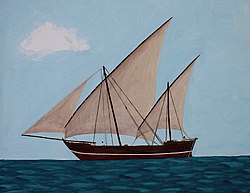Age of Discovery/1492 - First Contact: Unterschied zwischen den Versionen
(N) Markierung: Quelltext-Bearbeitung 2017 |
Keine Bearbeitungszusammenfassung Markierung: Quelltext-Bearbeitung 2017 |
||
| Zeile 4: | Zeile 4: | ||
{{Aufgabe-en| | {{Aufgabe-en| | ||
#Read the texts and | #Read the texts and anwser the questions. | ||
## Vergleiche Bild und Text: (Das Bild wurde erst viel später hergestellt.) | ## Vergleiche Bild und Text: (Das Bild wurde erst viel später hergestellt.) | ||
## Beschreibe, wie Kolumbus die Ureinwohner sieht: | ## Beschreibe, wie Kolumbus die Ureinwohner sieht: | ||
Version vom 18. Februar 2021, 05:39 Uhr
- Read the texts and anwser the questions.
- Vergleiche Bild und Text: (Das Bild wurde erst viel später hergestellt.)
- Beschreibe, wie Kolumbus die Ureinwohner sieht:
- Welche Erwartungen hat Kolumbus?
- Then do the interactive exercises.
Christopher Columbus believed that the western sea route would enable him to reach the Spice Islands in India more quickly. He offered his services to the Spanish king, who supported him and had a fleet of three ships (Nina, Pinta, Santa Maria) equipped.
Columbus set out on August 3, 1492. In his ship's log we also find the following entries:
September 25, 1492: We had to suffer a lot from calm winds.
October 10, 1492: My people complained about the long duration of the voyage, which seemed unbearable to them.
11/12 October 1492: At two o'clock in the morning land came into sight. We took in all the sails and waited until daybreak, when we reached an island.
There we immediately saw naked natives. I went ashore on board a boat with weapons. There I unfurled the royal flag and told my companions that I was taking possession of the island in the name of the King and Queen. Immediately, numerous natives of the island gathered at that place.
Wanting to win their friendship, and noticing that these were the people who were more likely to be won over and converted to our faith by love, I gave some of them a few colored coins and some necklaces of glass beads, which they hung around their necks, and all-hand other things of little value, in which they found great pleasure.
Afterwards they came swimming to our boats in which we were, and brought us parrots and balls of cotton thread, throwing spears and many other things, and exchanged them for things we gave them, such as small glass beads and bells.
They all walk around naked like their mother gave birth to them, including the women. They do not carry weapons. They are certainly excellent workers; they have bright minds, for I see that they are very quick to repeat anything that is said to them. Moreover, I believe that they could easily be converted to Christianity, for it seems to me that they have no religion yet.
Monday, Nov. 12, 1492: The Indians are firmly convinced that we have come from heaven. Doubtless-there are huge quantities of gold in these areas, and not without reason do the Indians say that there are places in these islands where the gold is dug out of the earth and the people wear it as thick rings on their necks, ears, arms and legs. There are also precious stones and endless spices.
Interactive exercises
Complete the story with the verbs in the simple past. Sometimes you have to use the negative form!
Columbus thought (think) that the earth was(be) round. He wanted(want) to sail west from Europe to India. Columbus first asked (ask) for money and ships from the King of Portugal. The King didn't want (not/want). So Columbus went (go) to Spain. Queen Isabella gave (give) him three ships.
Columbus sailed (sail) from Spain on August 3rd, 1492. He was (be) a good sailor, but his men were(be)afraid. Things became(become) difficult and they wanted (want) to sail back to Spain. Columbus said (say) “No”.
So on October 12th, 1492 Columbus found (find) America.
Write questions about Columbus and his trip to America!
0. Columbus thought that the Earth was round.
(What) What did Columbus believe?
1. He wanted to sail west.
Where did he sail|die he sail to()
2. Columbus went to Spain.
Where did he go|did Columbus go()?
3. He sailed from Spain on August 3rd, 1492.
When did he sail()?
4. The trip took ten weeks.
How long did the trip take|did it take()?






